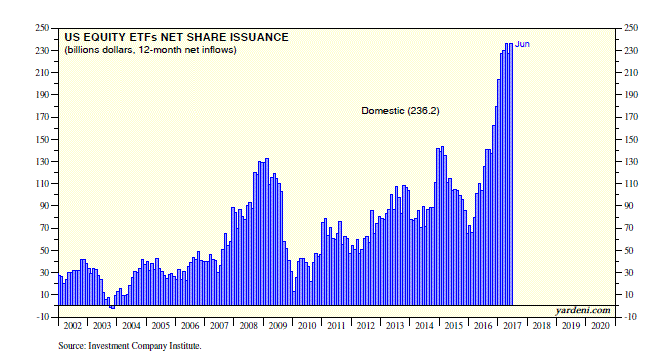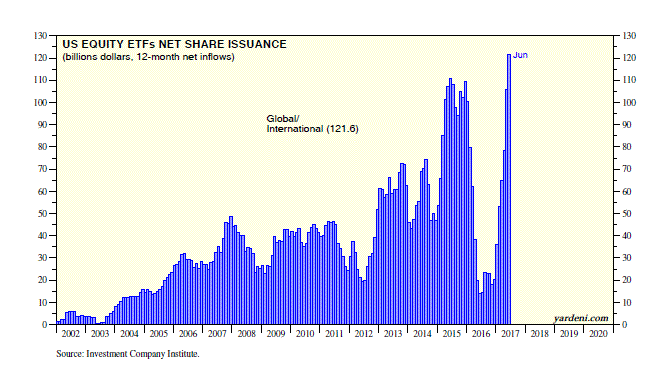The Call of the Wild is a short adventure novel by Jack London. It was published in 1903 and set in Yukon, Canada during the 1890s Klondike Gold Rush. The central character of the novel is “Buck,” a large and powerful, but domesticated, St. Bernard-Scotch Shepherd dog. Buck is stolen from his home at a ranch in Santa Clara Valley, California, and sold to be a sled dog in Alaska. He becomes increasingly wild as he is forced to fight to survive and dominate other dogs. By relying on his basic instincts, he emerges as a leader in the pack.
This story seems to portray current developments in the White House and, more broadly, in Washington, DC. It also captures the essence of what we may be starting to see in the stock market. Following the stock market debacles of the early and late 2000s, retail investors retreated from the stock market and turned relatively domesticated, with more of their savings going into liquid assets and bonds. Since Election Day, they seem to have heard the call of the wild. Their feral instincts have been awakened, triggering a gold rush into both domestic and global stock markets.
Over the past 12 months through June, a record $357.8 billion has poured into equity exchange-traded funds (ETFs), led by $236.2 billion going into domestic ETFs and $121.6 billion going into ETFs that invest globally. All three inflows are at, or near, recent record highs. Admittedly, some of these inflows came from equity mutual fund outflows, particularly from domestic ones. However, that could be the call of the wild convincing investors that the stock market is going higher regardless, so they are ditching managed funds for passive ones with cheaper management fees. Consider the following developments:
(1) For a few dollars less. Apparently, Fidelity Investments has heard the call of the wild. The provider of both active and index investment products is lowering fees on 14 of its 20 stock and bond mutual funds as of August 1. The average expenses across Fidelity’s stock and bond index fund lineup will decrease to 9.9 basis points, down from 11.0 basis points. The expense reductions are expected to save current shareholders approximately $18 million annually, Fidelity said.
(2) Gold rush. In a July 18 earnings conference call, Walt Bettinger, the CEO of Charles Schwab, said:
“Strong client engagement and demand for our contemporary approach to wealth management have led to business momentum that ranks among the most powerful in Schwab’s history. Equity markets touched all-time highs during the second quarter, volatility remained largely contained, short-term interest rates rose further, and clients benefited from the full extent of the strategic pricing moves we announced in February. Against this backdrop, clients opened more than 350,000 new brokerage accounts during the second quarter, bringing year-to-date new accounts to 719,000—up 34% from a year ago and our strongest first half total in seventeen years.”
(3) The howling. All this supports my howling about a possible melt-up since early 2013—when Washington didn’t push the economy off a fiscal cliff, as was widely feared, though not by me. I started to argue back then that the bull market was more likely to end with a melt-up before there was any meltdown.
Today, I am raising the odds of the Melt-Up scenario from 40% to 50%. The Meltdown scenario remains at 20%, while the Nirvana scenario gets cut from 40% to 30%. By the way, a melt-up followed by a meltdown won’t necessarily cause a recession. It might be more like 1987, creating a great buying opportunity, assuming that we raise some cash at the top of the melt-up’s ascent. Our animal instincts will have to overcome our animal spirits, I suppose.
(4) The swamp. The stock market might continue to melt up during the remaining dog days of summer, blissfully ignoring the swamp people in Washington, who are mostly away on vacation. Unfortunately, they’ll be back. The Senate and House have 12 joint working days before September 29, when the Treasury Department would no longer be able to pay all of the government’s bills unless Congress acts. A default could set off turmoil in world financial markets.
Talks among Treasury Secretary Steven Mnuchin, Senate Majority Leader Mitch McConnell, and Senate Minority leader Charles Schumer broke up Tuesday morning with no progress on raising the country’s debt ceiling, an impasse that could threaten yet another fiscal cliff cliffhanger for the financial markets. That may turn out to be yet another buying opportunity. Stay tuned.


